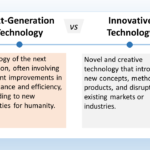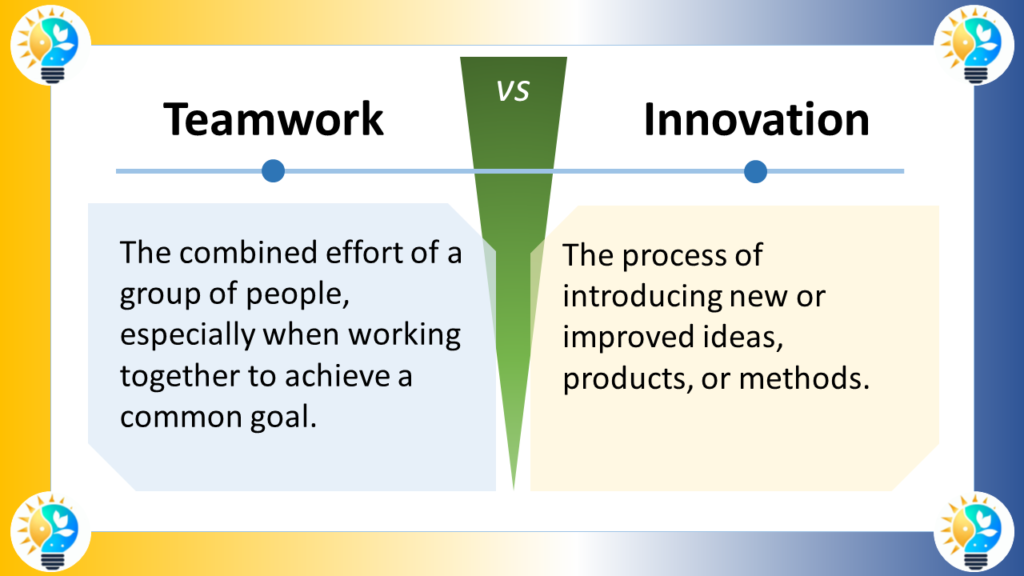Both next-generation technology and innovative technology signify advancements, but while next-generation technology focuses on future capabilities, innovative technology actively introduces new concepts or products to drive progress.

In the realm of technological advancement, Innovative Technology and Next-Generation Technology are terms that are often spoken of with great anticipation and interest. Each term has its own distinct meaning and implications for the future of technological development.
Definition
Defining Innovative Technology
Innovative Technology refers to novel inventions or substantial improvements over existing technologies. Innovation can happen in any field and at any level, from minor upgrades to major leaps forward.
Characteristics of Innovative Technology
- Novelty: Incorporates new ideas or approaches.
- Enhancement: Provides better functionality or efficiency.
- Solutions: Addresses specific needs or challenges in a new or improved way.
Defining Next-Generation Technology
Next-Generation Technology, however, implies the succession of current technology, embodying the future state of advancements. It suggests a new era of more advanced, powerful, and sophisticated technologies that build upon the foundation of their predecessors.
Characteristics of Next-Generation Technology
- Advancement: Represents a significant leap from current technology, setting a new benchmark.
- Futuristic: Often involves forward-thinking concepts that are on the cusp of becoming mainstream.
- Superiority: Is expected to outperform current technology in many aspects.
Exploring a Variety of Synonyms for Innovative Technology
- Advanced Technology
- Cutting-Edge Innovations
- Cutting-Edge Breakthroughs
- Disruptive Tech
- Emerging Technologies
- Forward-Looking Tech
- Futuristic Innovations
- Groundbreaking Developments
- High-Tech Breakthroughs
- Innovative Breakthroughs
- Inventive Solutions
- Leading-Edge Advancements
- Modern Technological Breakthroughs
- Progressive Advancements
- Next-Generation Technology
- Novel Tech
- Revolutionary Tech
- State-of-the-Art Solutions
- State-of-the-Art Innovations
- Trailblazing Innovations
- Visionary Tech

Innovation is considered as a driving force in progress.
It includes the introduction of novel ideas, methods, or products that bring positive change and advancement.
For more information about innovations, check our glossary
Innovative Technology vs. Next-Generation Technology: Relationship and Relevance
Innovative Technology may not always lead to a new generation of technology; it could simply be an improvement within the existing framework. On the other hand, Next-Generation Technology is inherently innovative, as it sets the stage for what is to come, but it specifically denotes a new lineage or wave of technology that is poised to replace the current one.
Contextual Use of the Terms
Companies may engage with Innovative Technology to solve immediate problems, enhance existing products, or create new market opportunities. In contrast, they may invest in Next-Generation Technology to fundamentally redefine their product lines, anticipate future market needs, or establish themselves as leaders in technological evolution.
Examples of Utilization
The use of AI for predictive maintenance in manufacturing could be considered an Innovative Technology. It improves upon existing maintenance strategies by predicting when machines will need service before they break down.
The development and implementation of 5G wireless technology, with its significant improvements in speed, latency, and connectivity over 4G, is an example of Next-Generation Technology. It not only enhances mobile internet services but also enables new technological ecosystems, such as the Internet of Things (IoT) and smart cities, to thrive.
Comparison Innovative technology vs next-generation technology
Innovative technology and next-generation technology are related concepts but have distinct differences. Let’s explore these differences based on the search results:
- Definition:
- Innovative Technology: Innovative technology refers to the development and implementation of new ideas, methods, or products that bring about significant improvements or advancements in a particular field [1].
- Next-Generation Technology: Next-generation technology refers to future technological advancements, developments, and innovations that are enabled by the internet, software, and services. These technologies are expected to have a significant impact on various industries and drive innovation strategies [2].
- Focus:
- Innovative Technology: Innovative technology focuses on creating new solutions, products, or services that address specific problems, meet needs, or create new opportunities. It involves the application of creative thinking and problem-solving to develop something valuable and useful [1].
- Next-Generation Technology: Next-generation technology focuses on the advancement and evolution of existing technologies to bring about significant improvements in performance, capabilities, and functionalities. It aims to push the boundaries of what is currently possible and pave the way for future innovations [2].
- Scope:
- Innovative Technology: Innovative technology can encompass a wide range of areas, including but not limited to technology. It can involve new business models, organizational structures, or creative thinking that leads to meaningful and impactful change [1].
- Next-Generation Technology: Next-generation technology primarily focuses on technological advancements and innovations. It includes advanced robotics, artificial intelligence (AI), Internet of Things (IoT), quantum computing, 5G wireless networks, virtual reality, augmented reality, and blockchain, among others [2].
- Impact:
- Innovative Technology: Innovative technology aims to bring about positive changes and improvements in various aspects of society, such as efficiency, productivity, user experience, and sustainability. It can disrupt existing markets, create new opportunities, and drive economic growth [1].
- Next-Generation Technology: Next-generation technology has the potential to revolutionize industries and transform the way we live, work, and interact. It can enable network-enabled, miniature, and fully automated machines, improve communication, enhance efficiency, and drive innovation strategies [2].
In summary, while innovative technology focuses on creating valuable and useful solutions to address specific problems or needs, next-generation technology refers to future technological advancements and innovations that have the potential to bring about significant improvements and drive innovation strategies.
FAQ
Q: Can an innovative technology evolve into next-generation technology?
A: Yes, if an innovative technology lays the groundwork for a series of advancements that collectively represent a major leap forward, it can evolve into next-generation technology.
Q: Is next-generation technology always immediately successful?
A: Not necessarily. While next-generation technology holds promise, its adoption can be influenced by factors like cost, market readiness, and the availability of supporting infrastructure.
Q: How often does next-generation technology emerge?
A: The emergence of next-generation technology varies by industry and is influenced by the pace of research, investment, and technological breakthroughs.
Q: Do companies need to constantly chase next-generation technology to stay competitive?
A: While staying informed about next-generation technology is crucial, companies must balance this with the practicality of their current operations and market demands. Strategic investment, rather than constant chasing, is key.
Q: Are there risks involved in adopting next-generation technology too early?
A: Early adoption of next-generation technology can be risky due to uncertainties regarding stability, compatibility, and market acceptance. However, it can also provide a competitive advantage if executed well.


